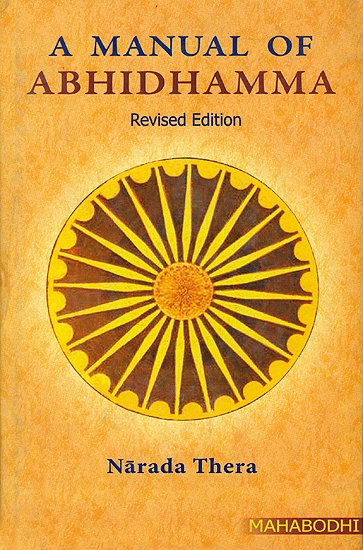Abhidhamma in Daily Life (by Ashin Janakabhivamsa)
by Ashin Janakabhivamsa | 66,666 words
English translation of "Abhidhamma in Daily Life" by Professor Ko Lay. Revised by Sayadaw U Silananda, International Theravada Buddhist Missionary University, Yangon, 1999...
Factor 11 - Kukkucca (remorse)
When a bad deed has been done, it is usually followed by kukkucca (remorse). Remorse occurs as a result of bad deeds. It is repentance over wrong things done and right things neglected. So there are two kinds of remorse.
Repentance of Four Rich Youths
There is a well-known phrase Du-Sa-Na-So which are the four syllables uttered by each of the four rich lads. They were very rich young men, yet they did not perform any meritorious deeds; they did only unwholesome deeds. For example, they transgressed moral precepts and engaged in sexual misconduct. As a consequence when they died they fell into Lohakumbhi niraya (hell of hot molten metal) for sixty thousand years. As they floated upwards in the molten metal for a short moment, they tried to speak of their repentance for their wrong deeds. But each one could utter only one syllable because of their great pain. They uttered “Du,” “Sa”, “Na” and “So” respectively.
What They Wanted to Say Were:
“In my past life I was born of a rich family. But I did not follow the way of merit. Instead, I had engaged in sexual misconduct.”
He felt intense remorse for his evil deeds. But he could utter only “Du” and sank to the bottom of the infernal cauldron. This man repented for having not done good deeds.
The other wished to say: “Painful consequences seem to be endless. I had done evil deeds as a human being”. But he could not complete his sentence. He uttered only one word “Na”. This man repented for having done unwholesome deeds.
The painful consequences of bad deeds do not wait to materialise in the future existences as in the case of the four rich lads who said, “Du”, “Sa”, Na“ and ”So". In the present life too the doers of bad deeds will be gnawed away by thoughts of their evil deeds. They will feel as if their bodies are burning to the extent that they perspire profusely.
Don't Leave Room For Remorse
Regrets over past wrong deeds will not expel your worries. Regret or remorse will not deliver you from painful consequences. Such repentance will only serve to develop kukkucca, another form of unwholesome mental state. The correct way to overcome remorse is to avoid doing evil deeds again, to make a firm resolution to refrain from akusala, evil action. If the evil deeds are not too serious, you will escape their evil results by virtue of your restraint, as taught by the Buddha in the Mahavagga Samyutta.
Strive Hard While There Is Ample Time
Everyone has to acquire education, wealth, and merit according to ability and skill. For such acquisition, opportunities and time are available only when one is young. If he has squandered away the good opportunities and time, he will come to wreck and ruin. There is a saying, “Strike while the iron is hot.” The country folk say, “Sow the seeds when there is rain”. If the rainy season is gone you cannot plough the fields and sow seeds and so you fail to harvest the grains.
Even if you realise too late that you have not done meritorious deeds, you should not lament for it. It is never too late to mend. Belated mindfulness is better than total neglect.
There is the story of an executioner who carried out death penalties during the time of the Buddha. He served the king in this way until old age when he was unable to discharge his duty and resigned from his office. The Venerable Sariputta happened to meet him when he was close to death and preached the Noble Dhamma to him. But the old man could not concentrate on the Dhamma because there was too much a contrast between what unwholesome deeds he did and the Noble Dhamma he was hearing.
Knowing the true situation, the Venerable Sariputta asked, “Did you execute the condemned criminals on your own will or by the orders of the king?” He replied: “I had to carry out the commands of the king. I did not kill them on my own will”. Then the Venerable Sariputta said, “If so, is there offence?” and continued his preaching. The old man began to think that he seemed to be free from guilt and his mind became calm. While listening to the Dhamma, he reached the stage of Culasotapanna (a Junior Stream-winner) and he was reborn in the celestial plane (Deva Loka) after his death.
(According to the Dhamma, actually, both he and the king were guilty of these executions even if he was carrying out the orders of the king. But the Venerable Sariputta, in order to calm him and create a clear mind to attend to his teaching, used a good strategy to ask questions that seemed to make him innocent.)
Note: The old executioner, admittedly, had taken many lives. But the Venerable Sariputta had asked helpful questions to extinguish kukkucca (remorse). When remorse disappeared the old man was able to concentrate his mind on the true Dhamma attentively and was reborn in the abode of celestial beings. Taking lessons from this story, people should not regret for the evil deeds they have done and the wholesome deeds they have not done, but try not to let fresh unwholesome kamma to arise, and make effort to perform good deeds from the time they come to know of this fact.
